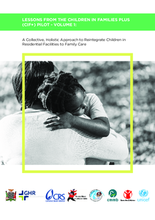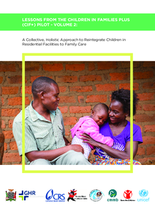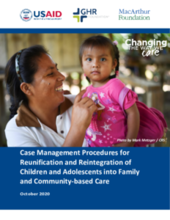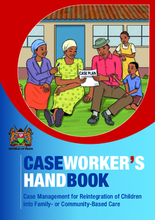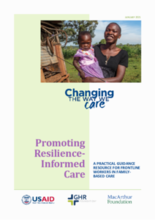Displaying 151 - 160 of 991
The CIF+ pilot is a collaborative, locally led, intensive effort with the main aim to reintegrate 200 children from Child Care Facilities (CCFs) in Lusaka district, into families over a period of three years (2019-2021).
Building on the CIF+ Learning Brief Vol 1.pdf, Volume 2 draws from CIF+ partner programming experience, achievements and lessons learned. This document outlines lessons for stakeholders that are interested in child reintegration efforts and highlights examples of the pilot as it works to support children and families in Zambia.
În 2021, Changing the Way We Care a lansat o analiză situațională a sistemului de îngrijire a copilului în Republica Moldova. Rezultatul acestei analize sunt 8 rapoarte bazate pe cercetări ample ale partenerilor CTWWC: Copil, Comunitate, Familie (CCF) Moldova, Keystone Human Services International, Moldova și Parteneriate pentru fiecare copil (P4EC). Aceste rapoarte oferă o imagine de ansamblu a situației copiilor vulnerabili și a familiilor acestora din Moldova, atât în contextul dezinstituționalizării, cât și al prevenirii plasării în instituții rezidențiale.
Scopul studiului este de a elabora o serie de recomandări practice concrete pentru
schimbarea cunoștințelor, atitudinilor și practicilor grupurilor țintă incluse în cercetare în
vederea eliminării barierelor existente în procesul de reintegrare a copiilor
dezinstituționalizați și a prevenirii separării de părinți a copiilor din familii vulnerabile prin
evaluarea și analiza nivelului de cunoștințe, atitudini și practici în domeniul reintegrării
familiale a copiilor separați și prevenirii riscurilor de separare.
Scopul studiului este de a identifica o serie de informații relevante cu privire la factorii
de succes și cei de risc în procesul de reintegrare familială, necesare pentru a formula
recomandări care să contribuie la decizii bazate pe probe în îmbunătățirea acestui
proces, prin prisma inițiativei CTWWC.
Case Management Procedures for Reunification and Reintegration of Children and Adolescents into Family and Community-based Care was developed together with Secretary of Social Welfare (SBS), the Office of the Child and Youth Advocate (PNA), Guatemala’s Attorney General (PGN), the Judicial Branch (OJ), the National Council of Adoptions (CNA), ASOCRIGUA and Hogar Aldeas de Esperanza. It was informed by Changing the Way We Care’s work in Kenya on the Caseworker’s Guidebook: Case Management for Reintegration of Children into Family or Community-Based Care, adapted to the Guatemalan context.
This Handbook is a summarized, simplified version of the Case Worker’s Guidebook for Case Management for Reintegration of Children/Young Adults into Family- or Community-Based Care. It provides an overview of the principles and practices of case management for reunification and placement of children/young adults outside of parental care (e.g., street-connected children/young adults or from Charitable Children’s Institutions and Statutory Children’s Institutions) into family- and community-based care, up until sustainable reintegration is achieved. The Handbook aims to provide an easy and quick reference to critical information and “how to” about case management for reintegration.
This practical guidance is for anyone working with children at risk of entering, already living in, preparing or having already left care. It discusses why and how to support children who are at risk of or who have already experienced adverse experiences that might lead to distress or trauma.
The strengths-based assessment tool serves to both prevent family breakdowns and reintegrate children from institutions back into families (or other family-based or alternative care options). This article provides an overview of the tool, including its purpose, set-up and functionality within a case management system.
These presentations from Know-How Center Bulgaria, Children and Family Initiative, and Changing the Way We Care, were delivered during the September 30, 2021, workshop of the Care Measurement Task Force of the Transforming Children's Care Global Collaborative Platform. The focus of the workshop was translating research evidence into action.

